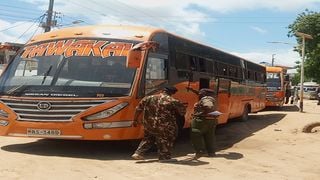
A convoy of buses at one of the roadblocks on the Lamu-Mombasa route. Commuters plying the route have expressed disappointment after the county security committee refused to remove roadblocks.
| Kalume Kazungu | Nation Media GroupLamu
Premium
Order banning police roadblocks offers short-lived relief in troubled Lamu
Lamu residents who use the Lamu-Witu-Garsen route are disappointed that the government’s decision to remove some police checkpoints across the country does not affect the troubled road.
The roadblocks, a source of frustration for many travellers on that route, will remain in place.
Police Inspector-General Hilary Mutyambai and traffic commanders resolved at a recent meeting that roadblocks and static police checks be removed because of complaints from motorists that traffic officers use them to collect bribes.
But speaking to Nation.Africa on Wednesday, Lamu County Commissioner Irungu Macharia maintained that roadblocks in Lamu will not be removed as they aid in managing security escorts.
“No roadblock along the Lamu-Witu-Garsen route will be removed. Ours are for the management of security escorts and not traffic. They are part of the greater county security strategy,” he said.
The announcement from the National Police Service had excited users of that road.
For more than eight years, travellers in Lamu have been subjected to numerous restrictions, including the requirement that all passenger vehicles travel in one convoy escorted by a vehicle of armed police officers.
There are also at least four roadblocks between the Mokowe Depot in Lamu and the Minjila junction in Tana River County.
They are in Ndeu, Witu, Gamba and Itsowe.
Collecting bribes
These checkpoints are managed by the police and Kenya Defence Forces soldiers.
Passengers are usually required to alight with all their luggage for checks at some of the checkpoints before being allowed to proceed.
Residents that Nation.Africa spoke to on Wednesday said they were excited at the news that static roadblocks and police checks would be removed across the country.
Ali Shebwana, a Lamu elder and frequent user of the Lamu-Witu-Garsen road, said that while he understood that roadblocks were important for security in the county, he was disappointed that some officers had turned them into a cash cow.
Mr Shebwana alleged that officers were concentrating more on collecting bribes from motorists than on security.
“Roadblocks are crucial for Lamu. The area is under a security operation but we had reached a point of despair because of what our police usually engage in at every roadblock,” he said.
“People who can afford to give the police Sh100 or Sh150 are allowed to pass without officers caring whether they are criminals or drug peddlers.”
Mubarak Sheikh Mohamed, the Lamu route manager for Munawar Shuttle, said the company’s drivers are tired of the roadblocks.
Most of the police officers, he said, are only after money.
He said drivers are harassed, especially if they fail to offer between Sh50 and Sh200 at each checkpoint.
“I congratulate our officers for restoring peace and stability on the Lamu route. Security is tight. KDF are usually seen patrolling along the route daily,” he said.
“The only concern we have is these roadblocks where you have to pay something before you are allowed through, whether you’re on the right or wrong side of the law.”
He said drivers travelling from Lamu to Malindi and back spend at least Sh1,000 to bribe police at roadblocks.
“There are some roadblocks where they accept Sh50. At others, drivers pay Sh100 while other officers demand as much as Sh200 to allow drivers to proceed. This cash is paid depending on the size or status of the roadblock,” said Mr Mohamed.





